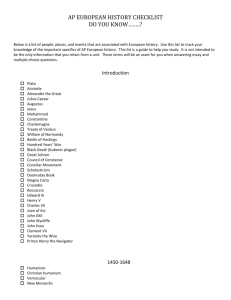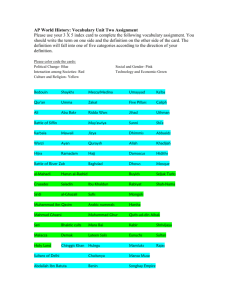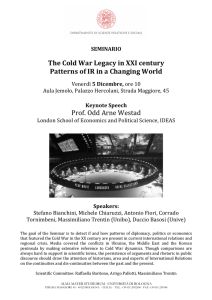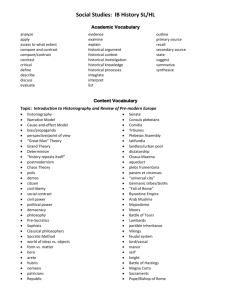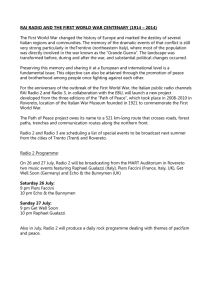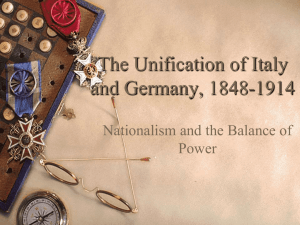Social Studies: AP European History
advertisement
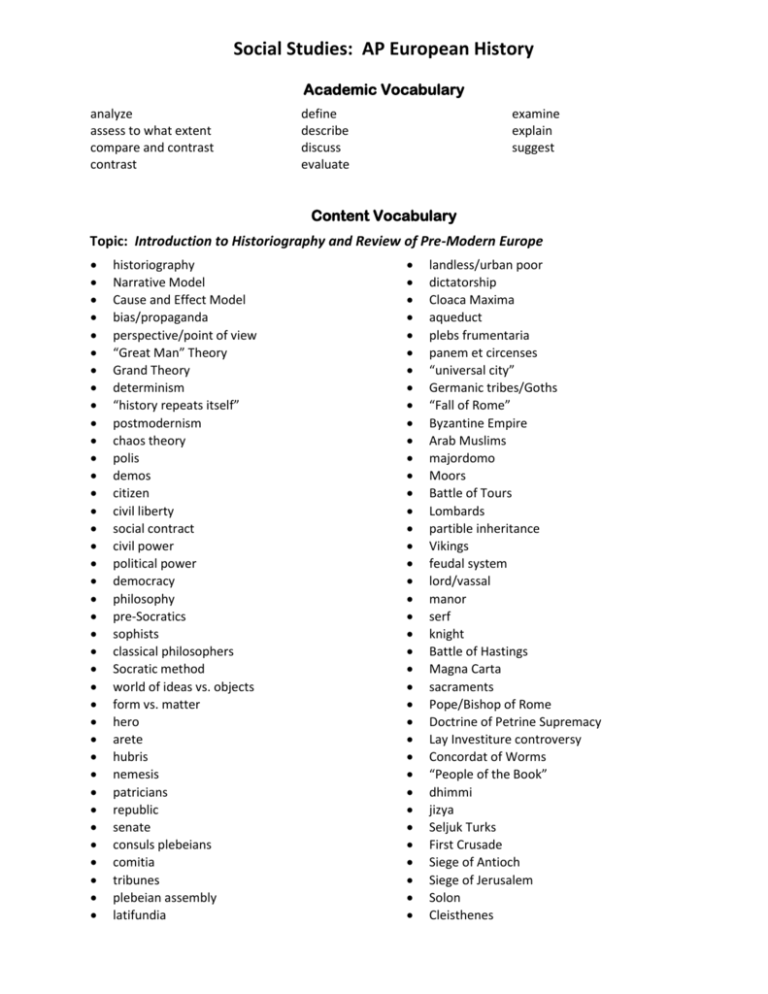
Social Studies: AP European History Academic Vocabulary analyze assess to what extent compare and contrast contrast define describe discuss evaluate examine explain suggest Content Vocabulary Topic: Introduction to Historiography and Review of Pre-Modern Europe historiography Narrative Model Cause and Effect Model bias/propaganda perspective/point of view “Great Man” Theory Grand Theory determinism “history repeats itself” postmodernism chaos theory polis demos citizen civil liberty social contract civil power political power democracy philosophy pre-Socratics sophists classical philosophers Socratic method world of ideas vs. objects form vs. matter hero arete hubris nemesis patricians republic senate consuls plebeians comitia tribunes plebeian assembly latifundia landless/urban poor dictatorship Cloaca Maxima aqueduct plebs frumentaria panem et circenses “universal city” Germanic tribes/Goths “Fall of Rome” Byzantine Empire Arab Muslims majordomo Moors Battle of Tours Lombards partible inheritance Vikings feudal system lord/vassal manor serf knight Battle of Hastings Magna Carta sacraments Pope/Bishop of Rome Doctrine of Petrine Supremacy Lay Investiture controversy Concordat of Worms “People of the Book” dhimmi jizya Seljuk Turks First Crusade Siege of Antioch Siege of Jerusalem Solon Cleisthenes Social Studies: AP European History Pericles “Funeral Oration” Thales Democritus Protogoras Socrates Plato Aristotle Homer Pindar Aeschylus Tarquinus Superbus Publius Valerius Lucius Jun. Brutus Tiberius/Gaius Gracchus Gaius Marias Lucius Cornelius Sulla Gaius Julius Caesar Octavian/Augustus Scipio vs. Cato Constantine Justinian Karl Martell Pepin Charlemagne Harold Godwynson William the Conqueror John Augustine, City of God Gelasius I Gregory VII Henry IV, HRE Alexios I Urban II Topic: The Birth of Modern Europe – Part One: The Renaissance Second, Third, Fourth Crusades Avignon Papacy “Babylonian Captivity” decadence Western Schism Council of Constance Pragmatic Sanction of Bourges Black Death bubonic, pneumonic, septicaemic plagues anti-Semitism flagellation merchants/”middle class” towns guilds/guild masters Hundred Years’ War longbow Battles of Crecy, Poitiers, Agincourt artillery/the cannon Renaissance/”Renatio” Golden Bull Guelphs vs. Ghibellines Contadini vendetta popolo grosso/minute Signoria medieval philosophy Scholasticism Humanism humanities “L’uomo universal” Medici bank Pazzi Conspiracy interdict subject perspective fresco movable-type printing press subject vs. technique Boniface VIII “Unam Sanctam” Philippe IV “le Bel” Clement V Urban VI Charles VIII Henry V Joan of Arc Charles IV, HRE Thomas Aquinas Giovani di Medici Cosimo di Medici Lorenzo and Guiliano de Medici Sixtus IV (della Rovera) Girolamo Savonarola Alexander VI (Borgia) Filippo Brunelleschi Leonardo da Vinci “Last Supper” Michelangelo (Buonarotti) “David” 2|P a g e Social Studies: AP European History Ceiling of the Sistine Chapel “The Last Judgment” Raphael (Sanzio) “The School of Athens” Johann Gutenberg Albrecht Durer Hans Holbein Jan van Eyck Pieter Bruegel Miguel de Cervantes William Shakespeare Topic: The Birth of Modern Europe – Part Two: The Upheaval in Christendom College of Cardinals tithe simony indulgences Purgatory absolution Jubilee Bargain Scriptural Truth Justification by Faith Alone “Good Works” Priesthood of All Believers pastor Diet of Worms Nationalism Staupitz Society vernacular Karsthans Peasants’ War War of the League of Schmalkald (Schmalkaldic War) Peace of Augsburg Predetermination/Predestination foreknowledge omniscience/omnipotence transcendent The Elect Hugenots Presbyterians Puritans Dutch Reformed Church annulment Act of Supremacy Church of England/Anglican Act of Succession Regency Counter-Reformation Council of Trento Index of Forbidden Books Baroque art Society of Jesus (Jesuits) Inquisition Dutch Revolt Spanish Inquisition Spanish Habsburgs Siglo de Oro Austrian Habsburgs “Sea Dogs” intervention in Dutch Revolt Anglo-Spanish War Armada Drake’s Raid Galleons Battle of Gravelines “Protestant Wind” Hugenots Guises St. Bartholomew’s Day Massacre Edict of Nantes Siege of Le Rochelle Raison d’état Peace of Augsburg Defenestration of Prague Bohemian Revolt Battle of White Mountain Burning of Magdeburg Battle of Lutzen French intervention Peace of Westphalia Sixtus IV (della Rovere) Alexander VI (Borgia) Julius II (della Rovere) Leo X (di Medici) Desiderius Erasmus In Praise of Folly Julius Exclusus Girolamo Savonarola Johann Tetzel Martin Luther “95 Theses” 3|P a g e Social Studies: AP European History “Exsurge Domine” Frederick “the Wise” Charles V, HRE John Eck Martin Luther Thomas Muntzer John Calvin John Knox Guy de Bray Henry the VIII Sir Thomas More “Defense of the Seven Sacraments” Katherine of Aragon Mary I Cardinal Thomas Wolsey Anne Boleyn Elizabeth I Jane Seymour Edward VI Catherine Parr Ignatius Loyola William “the Silent” (Orange) Phillip II Ferdinand I, HRE Sir Francis Drake Mary, Queen of Scots Charles IX Henri of Navarre/Henri IV Louis XIII Marie di Medicis Cardinal Richelieu (Armand Duplessis) Ferdinand II, HRE Christian IV Albrecht von Wallenstein Gustav Adolf Topic: Triumphs and Setbacks of Absolute Monarchs Magna Carta Grant Council of the Nobles limited government/monarchy Parliament House of Lords House of Commons United Kingdom absolute vs. limited monarchy Divine Right forced loans Petition of Right Law of Habeas Corpus Period of the Personal Rule Ship Money “Common Worship” Revolt of the Scots Presbyterians Puritans English Civil War Cavaliers Roundheads New Model Army The Commonwealth Pride’s Purge “Rump” Parliament Council of State Instrument of Government Lord Protector Stuart Restoration Mercantilism Navigation Acts Test Act/Exclusion Act Dutch Republic stadtholders Glorious Revolution joint monarchy Jacobite Risings/Rebellions Battle of the Boyne Bill of Rights Act of Toleration “The Sun King” “L’état, c’est moi.” intendents Palace and Gardens of Versailles cult of personality Balance of Power hegemony “natural boundaries” of France War of Spanish Succession Treaty of Utrecht Sultan, Supreme Caliph of Islam harem Battle of Kosovo Sharia/Kanun Battle of Lepanto 4|P a g e Social Studies: AP European History multinational/multiethnic Janissaries commercial dependency “Sick Man of Europe” Treaty of Karlowitz Treaty of Utrecht Pragmatic Sanction Peace of Westphalia War of Austian Succession “enlightened monarchy” Rus Tsar/Czar Kremlin “Time of Troubles” Romanov Dynasty Modernization/Westernization Great Northern War “Window on the West” warm-water/year-round port arable land First Russo-Turkish War “Polish Liberties” “exploding” diets John James VI (Scotland)/I (England) “The True Law of a Free Monarch” Charles I gham George Villiers, Duke of Buckin William Laud John Pym Oliver Cromwell Thomas Pride George Monk Charles II James II William “the Silent” (Orange) Rembrandt van Rijn William III (Orange) and Mary II James II “The Old Pretender” James “The Young Pretender” Charles “Bonnie Prince Charlie” Louis XIV Jean Baptiste Colbert Philip Bourbon William III John Churchill Osman I Suleyman “the Magnificent”/ “the Lawgiver” Selim II “the Drunkard” Charles VI Maria Theresa Frederick Hohenzollern “The Great Elector” Frederick Wilhelm I “The Sergeant King” Frederick II “the Great” Prince Volodymyr (Vladimir) Ivan III “Lord of all Rus” Ivan IV ‘the Terrible” Feodor Michael Romanov Peter the Great Catherine the Great Jan Sobieski Adam Smith’s pin factory industrial division of labor cotton gin spinning jenny flying-shuttle loom water frame risk management joint-stock company shares dividend charter initial public offering Topic: The British Ascendancy Mughal Empire (India) French East India Company Conquistadores slave trade chattel slavery four-field crop rotation heavy/steel plow seed drill full-body harness Enclosure Act/Movement “Putting-out System”/cottage industry factory system of production 5|P a g e Social Studies: AP European History stock market/exchange/bourse Virginia/East India Companies gentry peerage middle class Tories vs. Whigs Jacobite Risings/Rebellions House of Hanover era of Whig dominance “position” South Sea Company South Sea “Bubble” Crisis “sinking fund” “Patriots” War of Jenkins’ Ear/War of Austrian Succession Treaty of Aix-la-Chappelle Seven Years’ War Treaty of Paris 1763 War of American Independence Vasco da Gama Jean Baptiste Colbert Christopher Columbus Jethro Tull Eli Whitney James Hargreaves John Kay Richard Arkwright Anne George I Robert Walpole George II William Pitt George III separation of power checks and balances enlightened monarch/despot abolition of serfdom patronage of arts and sciences Pugachev’s Rebellion “Invisible Hand”/”Hidden Hand” market economy Aristotle Ptolemy Francis Bacon Nicolaus Copernicus On the Revolution of the Heavenly Orbs Galileo Galilei The Starry Messenger Johannes Kepler Sir Isaac Newton Thomas Paine Francois-Marie Arouet (Voltaire) Baruch di Spinoza Julien de la Mettrie Denis Diderot Rene Descartes John Locke Essay Concerning Human Understanding David Hume Immanuel Kant Topic: The Age of Reason geocentric model of the universe deductive reasoning Scientific Method systematic observation (under controlled circumstances) inductive reasoning heliocentric model of the universe elliptical orbits Galileo’s universal law of the acceleration of falling objects Newton’s universal law of gravitation philosophes salons Deism Rationalism Epistemology direct experience inductive reasoning “a priori” knowledge deductive reasonin ethics categorical imperativ “state of nature” natural right life, liberty, property limited governmen social contract 6|P a g e Social Studies: AP European History Groundwork on the Metaphysics of Morals Thomas Hobbes, Leviathan John Locke, Second Treatise of Government Thomas Jefferson, Declaration of Independence Jean-Jacques Rousseau, The Social Contract Baron de Montesquieu, The Spirit of the Laws James Madison Immanuel Kant, “What is Enlightenment?” Frederick II “the Great” Joseph II Catherine the Great Adam Smith, The Wealth of Nations Topic: The French Revolution and Napoleonic Europe Ancien Régime First Estate Second Estate exemptions from taille, corvée Third Estate bourgeoisie American Revolution debt crisis Estates-General Cahiers de doléances National Assembly Tennis Court Oath National Guard Hôtel des Invalides Bastille Le Grand Peur Women’s March to Versailles Tuileries Tricolor “Liberté, Égalité, Fraternité!” Decrees of August 5 Declaration of the Rights of Man and Citizen Civil Constitution of the Clergy Constitution of 1791 Legislative Assembly Hereditary Agent of the People Émigrés flight of the Bourbon family Declaration of Pillnitz Girondins Invasion of Austrian Netherlands National Convention Jacobins “Mountain” sans-culottes Battle of Valmy “La Marseillaise” Execution of Louis XVI and Marie Antoinette guillotine (First) Committee of Public Safety Maximum Price Act levée en masse de-Christianzation Republican Calendar Temple of Reason Supreme Being Vendéean Uprising Execution of Danton (Second) Committee of Public Safety Reign of Terror Law of Suspects Revolutionary Tribunal The Directory Monarchist Uprising “whiff of grapeshot” Northern Italian Campaign Treaty of Campo Formio Egyptian Campaign Battle of the Pyramids Battle of the Nile Coup d’état de Brumaire 1799 Consulate First Consul Plebiscite “man on horseback” Concordat of 1801 Code Civil amnesty for émigrés public works lycées Coronation as Emperor slave revolt in Haiti Battle of Trafalgar decisive battle 7|P a g e Social Studies: AP European History critical point feu d’enfer friction “On s’engage, pui on voit.” coup d’oeil Battle of Austeritz Battles of Jena/Auerstadt Battle of Friedland Continental System Berlin and Milan Decrees Peninsular War guerilla warfare Invasion of Russia Grande Armée “scorched earth” “Generals January and February” Confederation of the Rhine Grand Duchy of Warsaw tribute conscription Battle of Leipsig (Nations) Treaty of Fontainebleu Congress of Vienna “White Terror” “Hundred Days” Battle of Ligny Battle of Waterloo Louis XIV Louis XV Louis XVI Marie Antoinette (Habsburg) Anne Robert Jacques Turgot Jacques Necker Comte de Mirabeau Marquis de Lafayette Joseph II Leopold II Duke of Brunswick Georges Danton Maximilien Robespierre Napoléon Bonaparte Carl von Clausewitz Vom Krieg Horatio Nelson Roger Ducos Abbe Emmanuel-Joseph Sieyes Pius VII Napoléon I Toussaint L’Ouverture Joseph Fouché Joseph Bonaparte Arthur Wellesley, the Duke of Wellington Alexander I Mikhail Kutuzov Marie-Louise Habsburg Louis XVIII Gabhard von Blucher production line deskilling interchangeable parts Factory (“American”) System “Iron Law of Wages” survival wage unequal pay child labor worker safety chronic injuries/deformities “Black Lung”/”White Lung” abuse urbanization “multiplier effect” overcrowding/housing shortage sanitation/disease open sewer/cesspit Topic: The Masses: Unleashed and Restrained Congress of Vienna legitimacy containment Quadruple/Holy Alliance “Metternich System” Carlsbad Decrees prior restraint (censorship) secret societies secret police Industrial Revolution steam engine condenser machine tools railroads “The Rocket” Liverpool—Manchester Railway Portsmouth Dockyards 8|P a g e Social Studies: AP European History cholera/typhus crime fire Luddites Corn Law “Peterloo Massacre” Six Acts Anti-Corn Law League trade unions Combination Act Glasgow strike political liberalism/conservatism “classical” economic liberalism Tories vs. Whigs Reform Bill of 1831-32 boroughs (“rotten boroughs”) Chartist Movement People’s Charter universal male suffrage Utilitarianism Poor Law Sadler Commission Factory Act/Mines Act Ten Hours Act Metropolitan Police Act Metropolitan Fire Brigade Metropolitan Railway “Big Stink” underground sewers Public Health Act Chamber of Deputies July Ordinances July Revolution “Citizen King”/“Bourgeois Monarch” February 1848 Revolution Bonapartists Legitimatists republicans National Workshops Bloody June Days Second French Republic Second French Empire economic determinism class struggle bourgeoisie proletariat Labor Theory of Value Theory of Surplus Value means of production private property/property rights religion as “opiate of the masses” “Battle of Democracy” “Dictatorship of the Proletariat” classless society historical inevitability scientific vs. utopian socialism Klemens von Metternich Thomas Newcomen James Watt Henry Maudsley George Stephenson Marc Brunel David Ricardo, “On Wages” Benjamin D’Israeli, “Sybil” “King Ned Ludd” William Pitt “the Younger” Charles James Fox John Russell William IV Jeremy Bentham, “Principles of Morals and Legislation” John Stuart Mill Michael Sadler Robert Peel Edwin Chadwick John Snow Joseph Bazalgette Charles X Marquis de Lafayette Louis-Philippe Louis Blanc Louis-Napoléon Bonaparte (Napoléon III) Karl Max and Friedrich Engels The Communist Manifesto Capital (Max only) Romanticism “Noble Savage” Topic: Romanticism and Nationalism moral impulse categorical imperative 9|P a g e Social Studies: AP European History Romantic gardens garden follies Gothic Revival landscape nation cultural nationalism kultur vs. zivilization folklore and history political nationalism nation-state Young Europe creoles vs. peninsulares “Americans” Monroe Doctrine Philhellenes Battle of Navarino Walloons Treaty of London Celts “The Pale” Plantations Jacobite Risings/Rebellions Battle of the Boyne Penal Laws Act of Union Catholic Association Catholic Emancipation Tithe War Repeal Association “Monster Meetings” Young Ireland Potato Blight and Famine Young Irish Disorders Fenian rebels Home Rule “Christ of Nations” Polish Revolt Liberal Revolt Magyar Revolt Ausgleich/Dual Monarchy Carbonari Giovane Italia Austro-Sardinian War Redshirts Seven Weeks’ War “Blut und Boden” Volk German Confederation Zollverein Frankfurt Assembly Prussian Constitution Realpolitik Danish War non-aggression pact Treaty of Prague Spanish succession crisis Ems Dispatch Franco-Prussian War Battle of Sedan Second German Reich kaiser John Locke Essay Concerning Human Understanding Immanuel Kant Groundwork for the Metaphysics of Morals Jean-Jacques Rousseau J. M. W. Turner, “The Chain Pier” and “Weymouth Bay” John Constable, “The Cornfield” and “The Haywain” William Wordsworth, “Tintern Abbey” John Keats, “Ode on a Grecian Urn” William Blake, “The Tiger” Robert Burns, “To a Mouse” Johann Wolfgang von Goethe Faust Samuel Taylor Coleridge, “Rime of the Ancient Mariner” and “Kubla Khan” Johann Gottfried von Herder, “Materials for the Philosophy of the History of Mankind Guiseppe Mazzini, “On Nationality” Ernst Moritz Arendt, “Was 1st das Deutschen Vatterland?” Simon Bolivar José de San Martín Theodoros Kolokotronis Leopold I Patricus (St. Patrick) Brian Boru John Henry VII Elizabeth I Oliver Cromwell James II Daniel O’Connell Sir Charles Trevalyan 10 | P a g e Social Studies: AP European History William Gladstone Alexander Ypsilanti Prince Adam Czartoryski Klemens von Metternich Franz Josef Habsburg Louis Kossuth Giuseppe Mazzini Camillo di Cavour Il Risorgimento Victor Emmanuel Giuseppe Garibaldi Frederick-Wilhelm IV Otto von Bismarck, “Blood and Iron” Wilhelm I Napoléon III Leopold Hohenzollern Topic: Mature Industrial/Urban Society and Imperialism demographic transition birth/death/growth rates preindustrial industrial stabilization arithmetic vs. geometric growth Malthusian catastrophe city planning suburb terrace apartment Neoclassical and Gothic Revival iron/steel-framed structure Paris Commune Third French Republic Dreyfus Affair Conservatives vs. Liberals Reform Bill of 1867 trade unions Fabians Labour Party Women’s Social and Political Union Suffragists/”Suffragettes” universal male suffrage Reichstag (Germany)/ Reichsrat (AustriaHungary) Kulturkampf social welfare “old-age insurance” “worker’s compensation” “People’s Budget” Revisionist Socialists Social Democratic Parties Decembrist Revolt emancipation dumas/zemstvas “People’s Will” Pogroms Russo-Japanese War Bloody Sunday national duma Realism Salon des Refusés Impressionism evolution by natural selection “survival of the fittest” Social Darwinism eugenics dialectic thesis, antithesis, synthesis “Young Hegelians” Monism race, nation, state economic imperialism political/military imperialism cultural imperialism Social Darwinism/paternalism Thomas Malthus, An Essay on the Principle of Population Georges-Eugene Haussmann Joseph Paxton, Crystal Palace Gustave Eiffel, Eiffel Tower Alfred Dreyfus Emile Zola, “J’accuse” Benjamin D’Israeli William Gladstone Emmeline Pankhurst Otto von Bismarck Franz Josef David Lloyd George Nicholas I Alexander II Alexander III Nicholas II Father Georgy Gapon 11 | P a g e Social Studies: AP European History Edouard Manet, “Luncheon on the Grass” Napoléon III Claude Monet, “Impression: Sunrise,” “Haystacks” series, “Water Lilies” series, “Gare Saint-Lazare” Pierre-Auguste Renoir, “Luncheon of the Boating Party” Vincent van Gogh, “Starry Night” and “Wheatfield” series Georges Seurat, “Sunday Afternoon on the Island of La Grande Jatte” Carolus Linnaeus Charles Lyell, Principles of Geology Charles Darwin, On the Origin of Species, The Descent of Man Herbert Spencer, Principles of Biology George Frederick Wilhelm Hegel Frederick Nietzsche, The Will to Power Ernst Haeckel, Weltratsel Francis Galton, Hereditary Genius: Its Laws and Consequences Rudyard Kipling, “The White Man’s Burden” trench warfare trench foot trench fever “over the top” “no-man’s land” high-explosive shells bombproof shelters “walking” artillery fire chlorine, phosgene, mustard gas tank lighter-than-air vs. airplanes synchronized machine gun Gotha bomber “shell-shock” mutiny attrition vs. decisive battle Battle of Verdun Battles of Ypres Battle of Somme “Pals” battalions rationing/price controls Daylight Savings Time Union Sacrée Burgfrieden Defense of the Realm Act Easter Rising Irish Republican Army Armenian Genocide influenza epidemic Russian Revolution Provisional Government Bolshevik Revolution Treaty of Brest-Litovsk Topic: The Great War diplomatic equilibrium Crimean War “Realpolitik” Three Emperors’ League “Eastern Question” Pan-Slavism Second Russo-Turkish War Treaty of San Stefano Congress of Berlin Triple Alliance Reinsurance Treaty “Weltpolitik”/”place in the sun” “Young Turks” Triple Entente “Encirclement” Balkan League Black Hand “blank check” Austrian ultimatum Schlieffen Plan violation of Belgian neutrality Allied Powers Central Powers Tannenberg Campaign Battle of Tannenberg British Expeditionary Force Battle of the Marne stalemate “Irredenta” Battle of Caporetto Gallipoli Campaign ANZACs Arab Revolt 12 | P a g e Social Studies: AP European History submarine (unterseeboot) Lusitania and Sussex Sussex Pledge unrestricted submarine warfare Spring 1918 Offensive Battle of Belleau Wood Meuse-Argonne Offensive armistice demilitarized Rhineland reparations “Stab-in-the-Back” Myth “Fourteen Points” “Peace Without Victory” “Wilson Peace” self-determination League of Nations Paris Peace Conference Treaty of St. Germain Treaty of Trianon Treaty of Neuilly Treaty of Sevres mandates Treaty of Versailles Art. 231: “War Guilt Clause” reparations “Diktat” “November Criminals” welfare state/managed economy disillusionment Surrealism Dadaism Otto von Bismarck Wilhelm II Franz Josef Franz Ferdinand Gavarilo Princip Nicholas II Alfred von Schlieffen Helmuth von Moltke Herbert Hoover Erich Ludendorff Paul von Hindenburg Paul von Rennenkampf Alexander Samsonov Winston Churchill Thomas Edward Lawrence Faisal al Saud Anthony Fokker Erich von Falkenhayn Philippe Pétain Douglas Haig Erich Ludendorff David Lloyd-George Georges Clemenceau Alexander Kerensky V. I. Lenin Woodrow Wilson Vittorio Orlando Salvador Dali, “Persistence of Memory” Max Ernst, “Elephant Celebes” Marcel Duchamp, “Nude Descending a Staircase” Hannah Hoch, collages René Magritte, “This Is Not a Pipe” Georges Duhamel, Civilization Robert Graves, Goodbye to All That Erich Maria Remarque, All Quiet on the Western Front” John McCrae, “In Flanders Fields” Wilfred Owen, “Dulce et Decorum Est” Siegfried Sassoon, “Counterattack” Mensheviks “Revolutionary Defeatism” “Storming of the Winter Palace” Decree of Peace Treaty of Brest-Litovs Decree on Land War Communism kulaks communist command economy Topic: Rise of Mass Dictators Duma hemophilia Battle of Tannenberg “People’s Militia” abdication Soviets Petrograd Soviet moderate vs. radical socialists Bolsheviks 13 | P a g e Social Studies: AP European History bureaucracy “black market” “Lenin’s Famine” New Economic Policy Decree on Government Council of People’s Commissars Constituent Assembly Cheka “class enemies” “Red Terror” gulags Russian Civil War Red Army Kronstadt Revolt “Miracle of the Vistula” Union of Soviet Socialist Republics (USSR/Soviet Union) foreign intervention/occupation Communist International General Secretary of the Communist Party “Socialism in one country” Five Year Plans Kolkhozy (collective farms) “Stalin’s Famine” Ukrainian Revolt production quotas “Order of the Red Banner of Labor” totalitarian state cult of personality NKVD gulags (largest: Vorkuta) “Great Purge” “Trotskyites” “trenchocracy” Fasci di Combattimento Fascism/Fascists squadristi (“blackshirts”) general strike “March on Rome” emergency powers “Il Duce” totalitarian state “Corporate State” public works “Credere, Obbedire, Combattere” Lateran Treaty “Mare Nostro” Invasion of Abyssinia (Ethiopia) “Pact of Steel” (Axis) German (Weimar) Republic Reichstag Chancellor President reparations welfare state Spartakus vs. Freikrops devaluation/hyperinflation German Workers Party sturmabteilung (“brownshirts”) “Beer Hall Putsch” Dawes Plan Crash of the New York Stock Exchange Great Depression National Socialist (Nazi) Party “Aryan race”/”master race” “pure blood” untermenschen Anti-Semitism lebensraum “big lie” “terror will always succeed…” “stab in the back” myth “November Criminals” Volksgemeinschaft Election of 1932 Reichstag fire Enabling Act Schutzstaffel (“SS”) vs. SA “Night of the Long Knives” Fuhrer and Reich Chancellor “Ein Volk, Ein Reich, Ein Fuhrer” propaganda Hitler-Jugend Reich Labor Corps public works Second Republic Frente Popular Republicans Socialists/Communists Falange Espaniola foreign intervention bombing of Guernica Nicholas II Alexandra Alexei Gregory Rasputin 14 | P a g e Social Studies: AP European History Alexander Kerensky V. I. Lenin Leon Trotsky Joseph Stalin Benito Mussolini Victor Emmanuel III Pius XI Haile Selassie Gustav Streseman Adolf Hitler Charles Dawes Adolf Hitler, Mein Kampf Paul von Hindenburg Franz von Papen Ernst Rohm Heinrich Himmler Joseph Goebbels Alfonso XIII Francisco Franco Topic: The Second World War and the European Holocaust appeasement Locarno Pact pacifism disarmament rearmament remilitarization of the Rhineland Siegfried Line Anschluss Plebiscite Munich Conference/“Rape of Munich” Nazi-Soviet Nonaggression Pact Anglo-French guarantee of Poland invasion of Poland sitzkrieg blitzkrieg Luftwaffe tactical bombing airborne assault/paratroops armored assault mechanized infantry Maginot Line “Miracle of Dunkirk” Vichy France Operation Sea Lion Battle of Britain Royal Air Force (RAF) RADAR strategic vs. terror bombing Afrika Korps Sherman tank Battle of el Alamein Operation Torch Winter War occupation of the Baltic States Operation Barbarossa strategy of the “Scorched Earth” Battle of Khalkin Gol Siege of Leningrad Battle of Stalingrad Battle of Kursk “Second Front” debate “Soft Underbelly of Europe” “Arsenal of Democracy” Lend-Lease Act U. S. – British convoy system “shoot on sight” order Atlantic Charter Operation Husky Italian Campaign strategic bombing campaign Operation Overlord Battle of Normandy hedgerows Operation Cobra liberation of Paris Soviet occupation of Eastern Europe Ardennes Offensive Battle of the Bulge Battle of Berlin Volkssturm meeting at the Elbe V-E Day untermenschen “Aryan race”/”master race” “pure blood” eugenics/euthanasia Gypsies “an unwanted nation” “conspirators against the state” Nuremburg Laws on Reich 15 | P a g e Social Studies: AP European History Citizenship Nuremburg Laws for Protection of German Blood and German Honor Kristallnacht Occupation of Poland Warsaw Ghetto Warsaw Ghetto Uprising “Final Solution” labor camps Einsatzgruppen/”death squads” Babi Yar massacre extermination camps Auschwitz-Birkenau Treblinka Nuremburg Tribunals Adolf Hitler Winston Churchill Kurt von Schuschnigg Neville Chamberlain Joseph Stalin Vidkun Quisling Philippe Pétain Erwin Rommel Bernard Montgomery Georgy Zhukov Friedrich Paulus Franklin D. Roosevelt Dwight D. Eisenhower Benito Mussolini George Patton Anthony MacAuliffe Adolf Hitler, Mein Kampf Vienna Summit/Berlin Wall Cuban Missile Crisis “hare-brained schemes” “Separate Paths to Socialism” Hungarian Revolt “Prague Spring” Warsaw Pact invasion Brezhnev Doctrine ICBM nuclear deterrence “massive retaliation” “Mutual Assured Destruction” Strategic Arms Limitation Treaty “Era of Stagnation” centrally-planned economy central planning bureaus “black market” economy infrastructure disintegration invasion of Afghanistan Glasnost Perestroika market reforms Demokratizatsaya Intermediate Nuclear Forces Treaty Strategic Arms Reduction Treaty withdrawal from eastern Europe Solidarity free elections in Poland “Velvet Revolution” Topic: The Cold War and the Era of the Cold War Yalta Conference Declaration of Liberated Europe “Warsaw” vs. “London” Poles United Nations “Iron Curtain” Communist Bloc containment Truman Doctrine U.N. Recovery and Relief Administration European Recovery Program/“Marshall Plan” COMECON/”Molotov Plan” coup in Czechoslovakia Potsdam Conference Allied occupation of Germany “Marshall Plan” and reestablishment of German currency Berlin Blockade Berlin Airlift/“Operation Vittles” Vienna Summit Berlin Wall North Atlantic Treaty/NATO Warsaw Pact de-Stalinization “Kitchen Debate” Sputnik Cuban Revolution U-2 Affair Bay of Pigs Invasion 16 | P a g e Social Studies: AP European History Romanian Revolution Reunification of Germany Croatian War of Independence Kosovo War Bosnian War Dayton Peace Accords/IFOR “hardliners” Union Treaty August Coup Commonwealth of Independent States “shock therapy” “kleptocracy” Chechnyan wars and terrorism Statute of Westminster Commonwealth of Nations Indian National Congress Partition of India Partition of Palestine Israeli War of Independence Suez Crisis Indochina War Battle of Dien Bien Phu Algerian War European Coal and Steel Community Treaty of Rome European Common Market/ European Economic Community Value-Added Tax (V.A.T.) Maastricht Treaty European Union Euro European Constitution (rejected) Franklin D. Roosevelt Joseph Stalin Winston Churchill, “Iron Curtain” speech George Kennan, “The Sources of Soviet Conduct” Harry Truman Marcos George Marshall Vyacheslav Molotov Dwight D. Eisenhower Nikita Khrushchev, “Secret Speech” John F. Kennedy Fidel Castro Imre Nagy Leonid Brezhnev Alexander Dubček Richard Nixon Mikhail Gorbachev Boris Yeltsin Ronald Reagan Lech Walesa Margaret Thatcher John Paul II Vaclav Havel Nicolae Ceauşescu Helmut Kohl Josip Tito Gennady Yanayev Vladimir Putin Mohandas Gandhi Muhammad Ali Jinnah Gamel Abdel Nasser Ho Chi Minh Charles de Gaulle Robert Schuman 17 | P a g e
